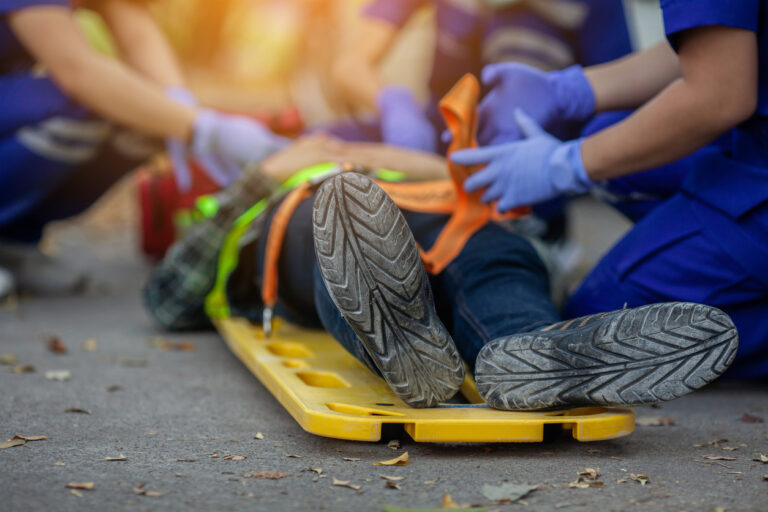by DR SHAWNEE BASDEN, BHB CLINICAL PSYCHOLOGIST
Lately, it seems the sound of sirens has become a common occurrence on our small island. Each time I hear them, especially at times when traffic is heavier or late at night, the first thing I do is reach for my phone to check online sources expecting to hear about a traffic accident.
Most of us are experiencing more anxiety lately, wondering if those we love are safe on our roads.
Accidents in Bermuda have climbed over the past several years with a brief decrease over the pandemic. Bermuda Hospitals Board (BHB) statistics from 2020 indicate 1,173 cases seen at KEMH Emergency Department and Lamb Foggo Urgent Care Centre, with 152 of those requiring admission and 16 admitted to the ICU. Of the total number of accidents, the large majority were locals. Only 18 were tourists and seven were under the age of 18.

My role as a clinical psychologist often involves interacting with individuals who have experienced a road traffic accident (RTA). Sometimes, this might involve working with a patient on the ward or as an outpatient. Other times I might be referred to see someone years after the accident because they continue to experience consequences from the accident. A large majority of RTA’s will involve head or bodily injury resulting in significant and chronic pain. RTA’s may also result in psychological trauma and fear, which can be just as debilitating as physical trauma.
Head injuries sustained from RTAs can range from mild, with very little intervention needed, to severe, requiring the need for physical and cognitive rehabilitation. At BHB this will often result in a multidisciplinary team approach involving physical and occupational therapy, physiatry (a medical specialty for physical and rehabilitation medicine), and clinical psychology.
The role of a clinical psychologist can be varied when assisting someone who has experienced a RTA. Often I must assess the individual to gain a better understanding of the extent of the head injury and determine interventions that might be better at getting someone back to their pre-injury functioning.
These assessments may show problems with memory and attention. More severe head injuries will often lead to the person having problems with planning and other complex cognitive tasks. We sometimes see personality changes or an increase in disinhibited behaviours.
One of my most memorable patients, whom I saw in Boston, was a young man who sustained a head injury in a car accident. He had trouble with memory and would get very agitated and irritable quickly – a significant change from his personality before the accident. However, most distressing to his loved ones was that he exhibited more sexualised behaviour, making inappropriate comments to members of the opposite sex which resulted in them feeling extremely uncomfortable.
While it helped his family to understand that he had little control over these actions, due to the nature of his injury, my work with the patient had to focus on giving strategies to decrease these behaviours so he could interact with society without significant discord.
He also engaged in extensive cognitive rehabilitation to improve memory function and other cognitive function that was impacted by his head injury. With physical and medical intervention this patient was able to return to university and live a relatively normal life, with continued physical and psychological care.
Other areas of focus after a RTA may be the treatment of chronic pain. Chronic pain must be addressed from a medical perspective with medications and physical therapy, however individuals will often benefit from psychological intervention too, especially in cases where pain cannot be adequately controlled with medications alone.
It is widely accepted that psychological management of chronic pain can be very effective in helping individuals cope with these experiences and improve quality of life. Traditionally, cognitive behavioural models of treatment are used. These work to help the individual understand the connection between a trigger, in this case pain, thoughts or assumptions made about the trigger, feelings associated with these thoughts and then the resulting behaviour. Pain management treatment will also address issues around activity pacing and the development of new ways of functioning in the context of significant disability or pain.
Finally, some individuals may experience emotional distress after a RTA. This may range from mild anxiety about riding or driving, especially at night time, or be more severe and disabling such as the development of post-traumatic stress disorder (PTSD). PTSD will almost always require intervention from a mental health professional and can cause significant distress and/or disruption to a person’s life.
Sometimes, after a significant threat to life, such as a RTA, individuals may also struggle with feelings of guilt, especially if someone else was injured in the accident, feelings of helplessness, and a new sense of danger in the world. Psychological interventions can help the person by giving a platform to talk about fears in a non-judgemental environment and also problem specific coping strategies.
When someone experiences a RTA it can be a terrifying experience for both the individual and their loved ones. Typically, the initial focus is on physical injury that may have been sustained. However, it is important that other aspects of injury are also addressed. This may include addressing cognitive or emotional difficulties associated with a head injury or managing chronic pain and emotional trauma.
Gold standard rehabilitation treatment programmes, as standard, employ a multidisciplinary approach to treatment which, in addition to physical health, will also include focus on cognitive rehabilitation and emotional health. If you or a loved one has experienced a RTA and may benefit from psychological intervention ask your doctor for assistance connecting with someone who may be able to help you.
Dr Shawnee Basden, PhD is a clinical psychologist with Bermuda Hospitals Board. Her case load is varied and includes those who have experienced traumatic brain injury or physical illness, persons with dementia illness and teens with eating disorders. Dr Basden also presents the Mental Health First Aid course offered by the Mid-Atlantic Wellness Institute for members of the public to learn more about mental illness including the specifics of common conditions.

